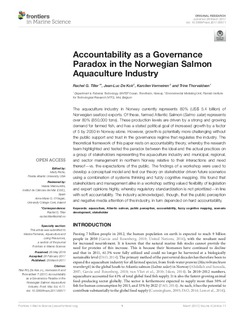| dc.contributor.author | Tiller, Rachel | |
| dc.contributor.author | de Kok, Jean-Luc | |
| dc.contributor.author | Vermeiren, Karolien | |
| dc.contributor.author | Thorvaldsen, Trine | |
| dc.date.accessioned | 2017-09-30T16:59:34Z | |
| dc.date.available | 2017-09-30T16:59:34Z | |
| dc.date.created | 2017-09-26T14:54:25Z | |
| dc.date.issued | 2017 | |
| dc.identifier.citation | Frontiers in Marine Science, Marine Fisheries, Aquaculture and Living Resources | nb_NO |
| dc.identifier.issn | 2296-7745 | |
| dc.identifier.uri | http://hdl.handle.net/11250/2457588 | |
| dc.description.abstract | The aquaculture industry in Norway currently represents 60% (US$ 5.4 billion) of Norwegian seafood exports. Of these, farmed Atlantic Salmon (Salmo salar) represents over 80% (850,000 tons). These production levels are driven by a strong and growing demand for farmed fish, and has a stated political goal of increased growth by a factor of 5 by 2050 in Norway alone. However, growth is potentially more challenging without the public support and trust in the governance regime that regulates the industry. The theoretical framework of this paper rests on accountability theory, whereby the research team highlighted and tested the paradox between the ideal and the actual practices on a group of stakeholders representing the aquaculture industry and municipal, regional, and sector management in northern Norway relative to their interactions and need thereof—vs. the expectations of the public. The findings of a workshop were used to develop a conceptual model and test our theory on stakeholder driven future scenarios using a combination of systems thinking and fuzzy cognitive mapping. We found that stakeholders and management alike in a workshop setting valued flexibility of legislation and expert opinions highly, whereby regulatory standardization is not prioritized—in line with soft accountability. The industry acknowledged, though, that the public perception and negative media attention of the industry, in turn depended on hard accountability. | nb_NO |
| dc.language.iso | eng | nb_NO |
| dc.rights | Navngivelse-Ikkekommersiell-DelPåSammeVilkår 4.0 Internasjonal | * |
| dc.rights.uri | http://creativecommons.org/licenses/by-nc-sa/4.0/deed.no | * |
| dc.subject | Aquaculture | nb_NO |
| dc.subject | Atlantic salmon | nb_NO |
| dc.subject | Public perception | nb_NO |
| dc.subject | Accountability | nb_NO |
| dc.subject | Fuzzy cognitive mapping | nb_NO |
| dc.subject | Scenario development | nb_NO |
| dc.subject | Stakeholder | nb_NO |
| dc.title | Accountability as a Governance Paradox in the Norwegian Salmon Aquaculture Industry | nb_NO |
| dc.type | Journal article | nb_NO |
| dc.type | Peer reviewed | nb_NO |
| dc.description.version | publishedVersion | nb_NO |
| dc.rights.holder | Copyright © 2017 Tiller, De Kok, Vermeiren and Thorvaldsen | nb_NO |
| dc.source.journal | Frontiers in Marine Science | nb_NO |
| dc.identifier.doi | 10.3389/fmars.2017.00071 | |
| dc.identifier.cristin | 1498433 | |
| dc.relation.project | Norges forskningsråd: 234139 | nb_NO |
| cristin.unitcode | 7566,2,0,0 | |
| cristin.unitname | Fiskeriteknologi | |
| cristin.ispublished | true | |
| cristin.fulltext | original | |
| cristin.qualitycode | 1 | |

